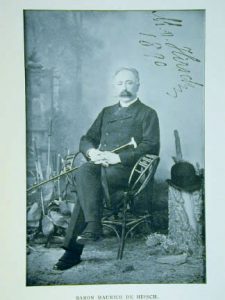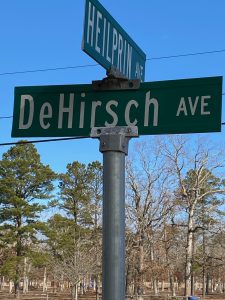A Short History of Philanthropy In Support of Jewish Farming
Back to the Land:
A New/Old Idea in the Jewish World
Seemingly out of nowhere in the 1800s, strong ideological currents started seeing return to the land as a way to strengthen the bodies and spirits of Jews. This new thinking was part of the Jewish Enlightenment era (Haskalah). Among other things, the Haskalah hoped to make Jews into more productive members of their societies. It came in reaction to commonly held stereotypes of Jews as parasites or luftmenschen, lamentable people “living from the air.”
According to one branch of this Enlightenment movement, “new” Jews returning to farming for the first time since the biblical era would enjoy rare liberties.
Baron Maurice de Hirsch (1831-1896)
Photo: Free Library of Philadelphia
Ideology Meets Generosity
Whatever the appeal of these new ideas, Jewish farming projects could only develop because of philanthropic support. From the biblical period onward, the Jewish world prioritized caring for co-religionists in need. Starting in the mid-nineteenth century, this tradition coalesced in the Diaspora into philanthropic organizations
With time, many of these organizations came to support agricultural settlement. The first major benefactor of Jewish agrarianization was Baron Maurice de Hirsch (1831-1896), who founded the Jewish Colonization Association in Paris in the 1890s. Over the next century, the JCA supported colonies in Russia, Romania, the Americas and in Palestine.
Local organizations – like the Hebrew Emigrant Aid Society in New York, the Hebrew Colonial Society of Baltimore and ORT in the Russian Empire – took on pivotal roles closer to sites of proposed farming settlements.
Zionist organizations resettled Jews from the Diaspora as farmers in Palestine; other philanthropists believed that impoverished Jews should be resettled as farmers wherever they resided or wherever good land and a benevolent government could be found. Prominent Jews in the West – like Jacob Schiff (1847-1920) in New York and the Rothschilds in London – also generously supported resettlement projects.
A street sign at the corner of DeHirsch and Heilprin Avenues, directly in front of the former DeHirsch Agricultural School, Woodbine, NJ, 2021.
Michael Heilprin was an important American-Jewish activist in the immigration of East European Jews to the United States.
In North America, institutional support for colonization professionalized with the founding of the Jewish Agricultural and Industrial Aid Society in 1900. Among its many contributions, the JAS took responsibility for publication of the journal The Jewish Farmer.

Now forgotten, the JAS and other support organizations prioritized cooperative associations among the colonists to improve profitability and to cultivate communal networks. In the Americas, many of these cooperative associations continued long after Jews stopped farming.

A booklet for the inaugural meeting of the Federation of Jewish Farmers of America, 1909. The Federation later created a purchasing coop for its member colonies.
The memory of Baron de Hirsch’s vision and generosity carries on today in southern New Jersey. See the clip below for an example.
Credit: Gillian Kaye

